The Impact of COVID-19 on the Hospitality, Leisure and Travel Industry
VerifiedAdded on 2022/11/24
|9
|2208
|153
Essay
AI Summary
This essay provides a comprehensive overview of the significant challenges encountered by the hospitality, leisure, and travel industries in the wake of the COVID-19 pandemic. It explores the immediate impacts, such as travel restrictions, decreased tourism, and the closure of businesses, along with the resulting economic downturn. The essay examines the specific difficulties faced by these sectors, including staff shortages, changing consumer behavior, and the need for adaptations to comply with health regulations. It also discusses the long-term effects, such as the importance of monitoring dynamic consumer forces, the implementation of new technologies like AI for improved customer service, and the potential for recovery through strategic planning and innovation. The analysis highlights the interconnectedness of these industries, the impact on both local and international economies, and the need for continuous adaptation to navigate the ever-changing landscape. Furthermore, the essay addresses the impact of COVID-19 on education, especially in fields like tourism and hospitality, and discusses the importance of research and solutions to help the industry. The essay concludes by emphasizing the importance of adaptation, innovation, and strategic planning to ensure the long-term survival and success of these critical sectors.
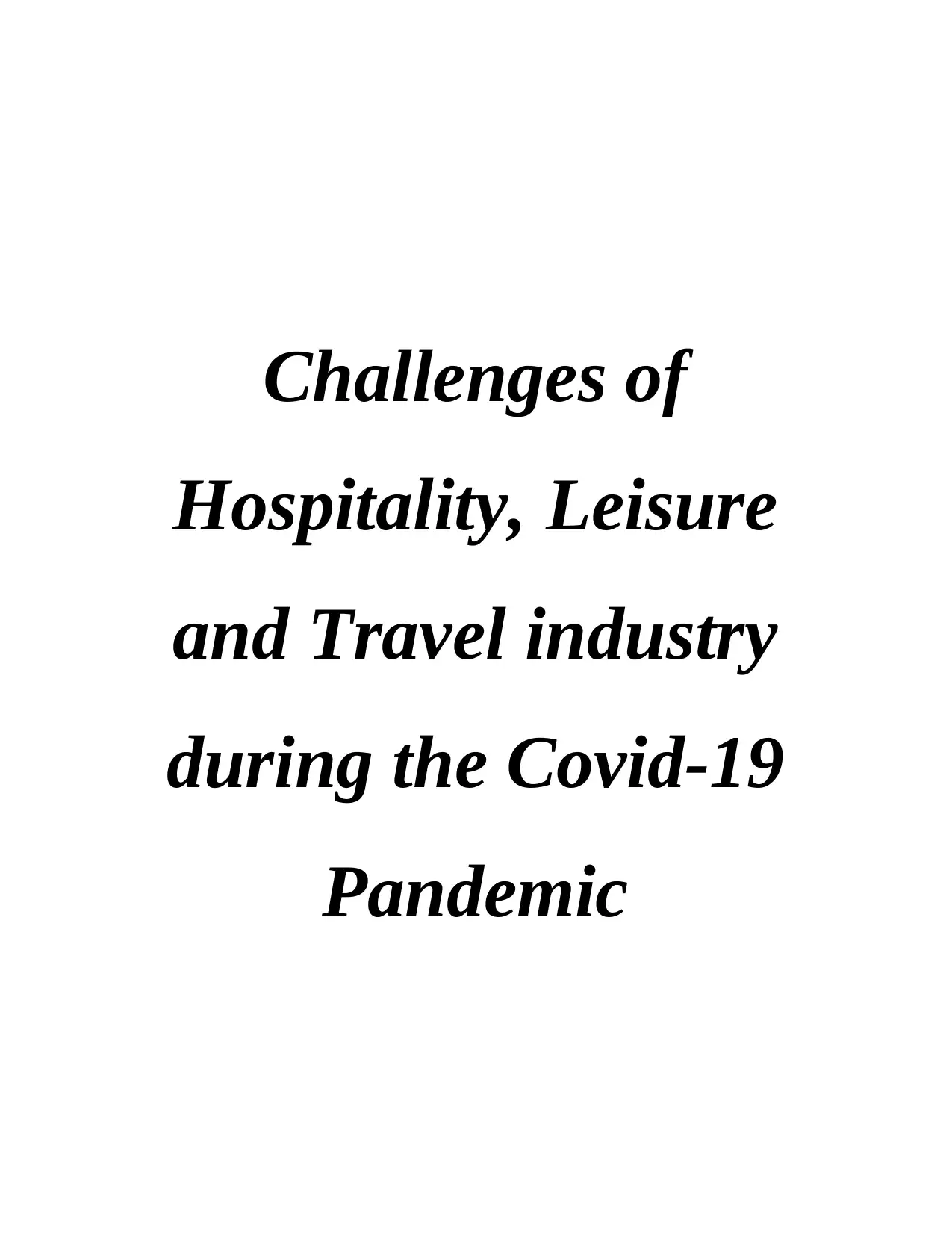
Challenges of
Hospitality, Leisure
and Travel industry
during the Covid-19
Pandemic
Hospitality, Leisure
and Travel industry
during the Covid-19
Pandemic
Paraphrase This Document
Need a fresh take? Get an instant paraphrase of this document with our AI Paraphraser


⊘ This is a preview!⊘
Do you want full access?
Subscribe today to unlock all pages.

Trusted by 1+ million students worldwide
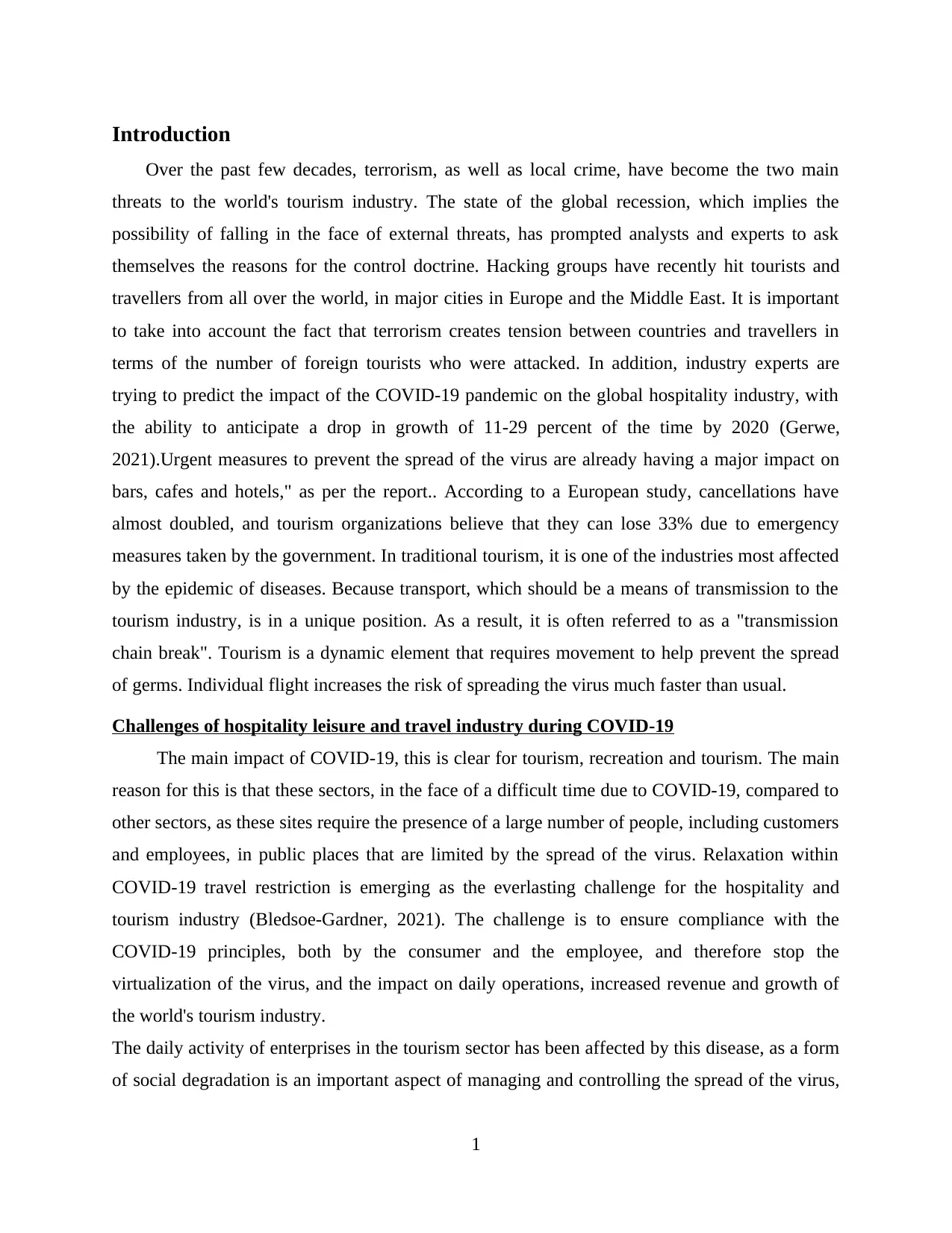
Introduction
Over the past few decades, terrorism, as well as local crime, have become the two main
threats to the world's tourism industry. The state of the global recession, which implies the
possibility of falling in the face of external threats, has prompted analysts and experts to ask
themselves the reasons for the control doctrine. Hacking groups have recently hit tourists and
travellers from all over the world, in major cities in Europe and the Middle East. It is important
to take into account the fact that terrorism creates tension between countries and travellers in
terms of the number of foreign tourists who were attacked. In addition, industry experts are
trying to predict the impact of the COVID-19 pandemic on the global hospitality industry, with
the ability to anticipate a drop in growth of 11-29 percent of the time by 2020 (Gerwe,
2021).Urgent measures to prevent the spread of the virus are already having a major impact on
bars, cafes and hotels," as per the report.. According to a European study, cancellations have
almost doubled, and tourism organizations believe that they can lose 33% due to emergency
measures taken by the government. In traditional tourism, it is one of the industries most affected
by the epidemic of diseases. Because transport, which should be a means of transmission to the
tourism industry, is in a unique position. As a result, it is often referred to as a "transmission
chain break". Tourism is a dynamic element that requires movement to help prevent the spread
of germs. Individual flight increases the risk of spreading the virus much faster than usual.
Challenges of hospitality leisure and travel industry during COVID-19
The main impact of COVID-19, this is clear for tourism, recreation and tourism. The main
reason for this is that these sectors, in the face of a difficult time due to COVID-19, compared to
other sectors, as these sites require the presence of a large number of people, including customers
and employees, in public places that are limited by the spread of the virus. Relaxation within
COVID-19 travel restriction is emerging as the everlasting challenge for the hospitality and
tourism industry (Bledsoe-Gardner, 2021). The challenge is to ensure compliance with the
COVID-19 principles, both by the consumer and the employee, and therefore stop the
virtualization of the virus, and the impact on daily operations, increased revenue and growth of
the world's tourism industry.
The daily activity of enterprises in the tourism sector has been affected by this disease, as a form
of social degradation is an important aspect of managing and controlling the spread of the virus,
1
Over the past few decades, terrorism, as well as local crime, have become the two main
threats to the world's tourism industry. The state of the global recession, which implies the
possibility of falling in the face of external threats, has prompted analysts and experts to ask
themselves the reasons for the control doctrine. Hacking groups have recently hit tourists and
travellers from all over the world, in major cities in Europe and the Middle East. It is important
to take into account the fact that terrorism creates tension between countries and travellers in
terms of the number of foreign tourists who were attacked. In addition, industry experts are
trying to predict the impact of the COVID-19 pandemic on the global hospitality industry, with
the ability to anticipate a drop in growth of 11-29 percent of the time by 2020 (Gerwe,
2021).Urgent measures to prevent the spread of the virus are already having a major impact on
bars, cafes and hotels," as per the report.. According to a European study, cancellations have
almost doubled, and tourism organizations believe that they can lose 33% due to emergency
measures taken by the government. In traditional tourism, it is one of the industries most affected
by the epidemic of diseases. Because transport, which should be a means of transmission to the
tourism industry, is in a unique position. As a result, it is often referred to as a "transmission
chain break". Tourism is a dynamic element that requires movement to help prevent the spread
of germs. Individual flight increases the risk of spreading the virus much faster than usual.
Challenges of hospitality leisure and travel industry during COVID-19
The main impact of COVID-19, this is clear for tourism, recreation and tourism. The main
reason for this is that these sectors, in the face of a difficult time due to COVID-19, compared to
other sectors, as these sites require the presence of a large number of people, including customers
and employees, in public places that are limited by the spread of the virus. Relaxation within
COVID-19 travel restriction is emerging as the everlasting challenge for the hospitality and
tourism industry (Bledsoe-Gardner, 2021). The challenge is to ensure compliance with the
COVID-19 principles, both by the consumer and the employee, and therefore stop the
virtualization of the virus, and the impact on daily operations, increased revenue and growth of
the world's tourism industry.
The daily activity of enterprises in the tourism sector has been affected by this disease, as a form
of social degradation is an important aspect of managing and controlling the spread of the virus,
1
Paraphrase This Document
Need a fresh take? Get an instant paraphrase of this document with our AI Paraphraser
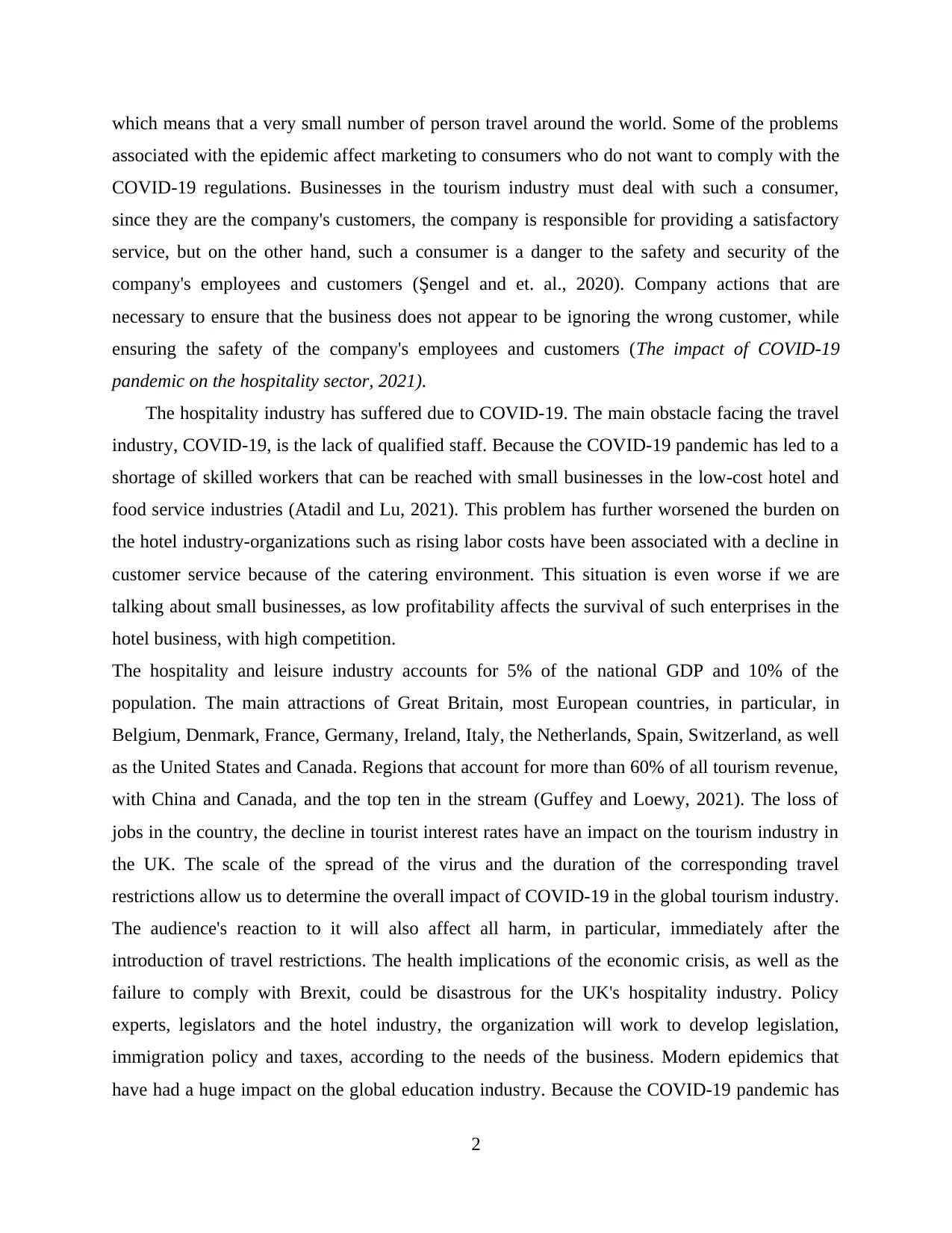
which means that a very small number of person travel around the world. Some of the problems
associated with the epidemic affect marketing to consumers who do not want to comply with the
COVID-19 regulations. Businesses in the tourism industry must deal with such a consumer,
since they are the company's customers, the company is responsible for providing a satisfactory
service, but on the other hand, such a consumer is a danger to the safety and security of the
company's employees and customers (Şengel and et. al., 2020). Company actions that are
necessary to ensure that the business does not appear to be ignoring the wrong customer, while
ensuring the safety of the company's employees and customers (The impact of COVID-19
pandemic on the hospitality sector, 2021).
The hospitality industry has suffered due to COVID-19. The main obstacle facing the travel
industry, COVID-19, is the lack of qualified staff. Because the COVID-19 pandemic has led to a
shortage of skilled workers that can be reached with small businesses in the low-cost hotel and
food service industries (Atadil and Lu, 2021). This problem has further worsened the burden on
the hotel industry-organizations such as rising labor costs have been associated with a decline in
customer service because of the catering environment. This situation is even worse if we are
talking about small businesses, as low profitability affects the survival of such enterprises in the
hotel business, with high competition.
The hospitality and leisure industry accounts for 5% of the national GDP and 10% of the
population. The main attractions of Great Britain, most European countries, in particular, in
Belgium, Denmark, France, Germany, Ireland, Italy, the Netherlands, Spain, Switzerland, as well
as the United States and Canada. Regions that account for more than 60% of all tourism revenue,
with China and Canada, and the top ten in the stream (Guffey and Loewy, 2021). The loss of
jobs in the country, the decline in tourist interest rates have an impact on the tourism industry in
the UK. The scale of the spread of the virus and the duration of the corresponding travel
restrictions allow us to determine the overall impact of COVID-19 in the global tourism industry.
The audience's reaction to it will also affect all harm, in particular, immediately after the
introduction of travel restrictions. The health implications of the economic crisis, as well as the
failure to comply with Brexit, could be disastrous for the UK's hospitality industry. Policy
experts, legislators and the hotel industry, the organization will work to develop legislation,
immigration policy and taxes, according to the needs of the business. Modern epidemics that
have had a huge impact on the global education industry. Because the COVID-19 pandemic has
2
associated with the epidemic affect marketing to consumers who do not want to comply with the
COVID-19 regulations. Businesses in the tourism industry must deal with such a consumer,
since they are the company's customers, the company is responsible for providing a satisfactory
service, but on the other hand, such a consumer is a danger to the safety and security of the
company's employees and customers (Şengel and et. al., 2020). Company actions that are
necessary to ensure that the business does not appear to be ignoring the wrong customer, while
ensuring the safety of the company's employees and customers (The impact of COVID-19
pandemic on the hospitality sector, 2021).
The hospitality industry has suffered due to COVID-19. The main obstacle facing the travel
industry, COVID-19, is the lack of qualified staff. Because the COVID-19 pandemic has led to a
shortage of skilled workers that can be reached with small businesses in the low-cost hotel and
food service industries (Atadil and Lu, 2021). This problem has further worsened the burden on
the hotel industry-organizations such as rising labor costs have been associated with a decline in
customer service because of the catering environment. This situation is even worse if we are
talking about small businesses, as low profitability affects the survival of such enterprises in the
hotel business, with high competition.
The hospitality and leisure industry accounts for 5% of the national GDP and 10% of the
population. The main attractions of Great Britain, most European countries, in particular, in
Belgium, Denmark, France, Germany, Ireland, Italy, the Netherlands, Spain, Switzerland, as well
as the United States and Canada. Regions that account for more than 60% of all tourism revenue,
with China and Canada, and the top ten in the stream (Guffey and Loewy, 2021). The loss of
jobs in the country, the decline in tourist interest rates have an impact on the tourism industry in
the UK. The scale of the spread of the virus and the duration of the corresponding travel
restrictions allow us to determine the overall impact of COVID-19 in the global tourism industry.
The audience's reaction to it will also affect all harm, in particular, immediately after the
introduction of travel restrictions. The health implications of the economic crisis, as well as the
failure to comply with Brexit, could be disastrous for the UK's hospitality industry. Policy
experts, legislators and the hotel industry, the organization will work to develop legislation,
immigration policy and taxes, according to the needs of the business. Modern epidemics that
have had a huge impact on the global education industry. Because the COVID-19 pandemic has
2
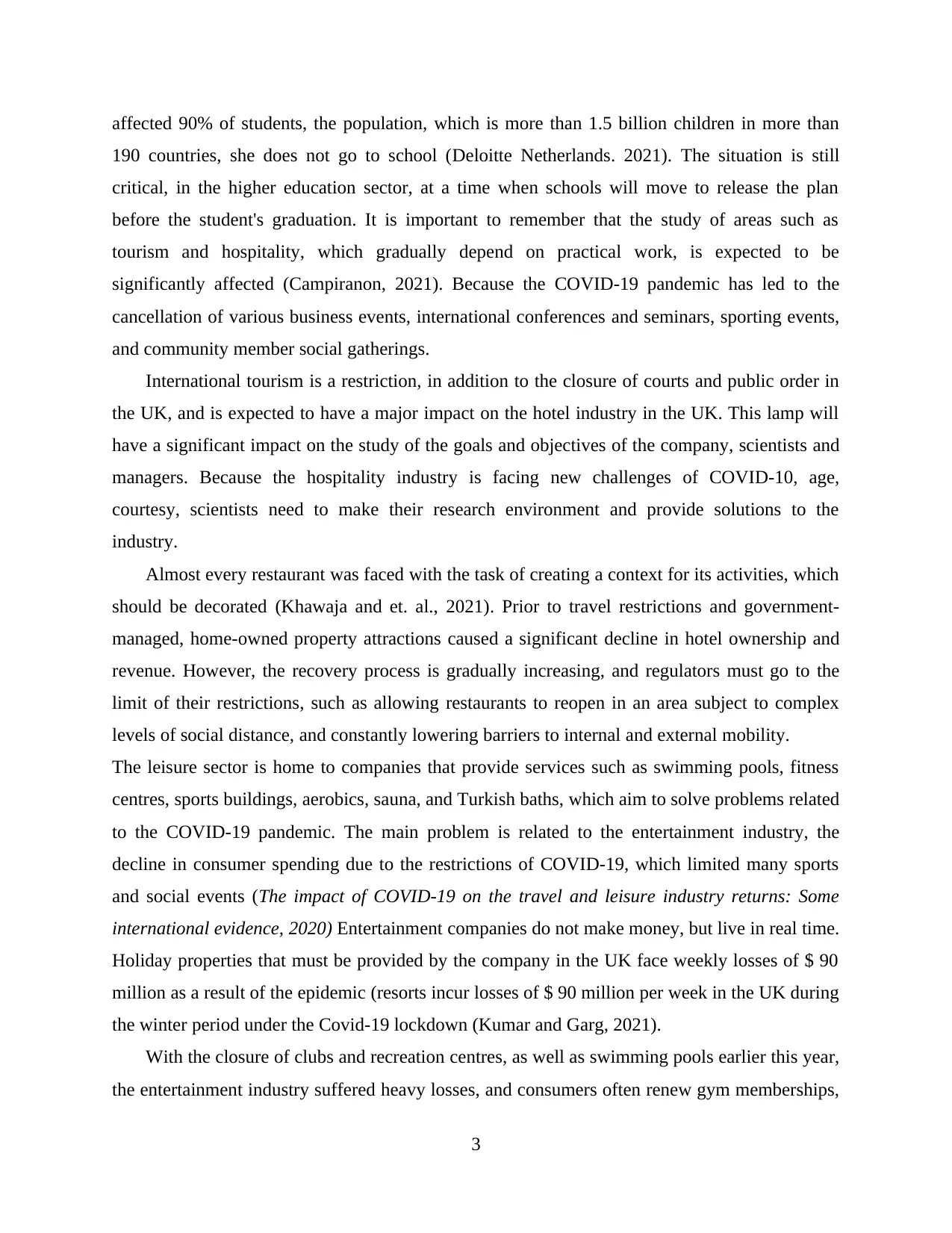
affected 90% of students, the population, which is more than 1.5 billion children in more than
190 countries, she does not go to school (Deloitte Netherlands. 2021). The situation is still
critical, in the higher education sector, at a time when schools will move to release the plan
before the student's graduation. It is important to remember that the study of areas such as
tourism and hospitality, which gradually depend on practical work, is expected to be
significantly affected (Campiranon, 2021). Because the COVID-19 pandemic has led to the
cancellation of various business events, international conferences and seminars, sporting events,
and community member social gatherings.
International tourism is a restriction, in addition to the closure of courts and public order in
the UK, and is expected to have a major impact on the hotel industry in the UK. This lamp will
have a significant impact on the study of the goals and objectives of the company, scientists and
managers. Because the hospitality industry is facing new challenges of COVID-10, age,
courtesy, scientists need to make their research environment and provide solutions to the
industry.
Almost every restaurant was faced with the task of creating a context for its activities, which
should be decorated (Khawaja and et. al., 2021). Prior to travel restrictions and government-
managed, home-owned property attractions caused a significant decline in hotel ownership and
revenue. However, the recovery process is gradually increasing, and regulators must go to the
limit of their restrictions, such as allowing restaurants to reopen in an area subject to complex
levels of social distance, and constantly lowering barriers to internal and external mobility.
The leisure sector is home to companies that provide services such as swimming pools, fitness
centres, sports buildings, aerobics, sauna, and Turkish baths, which aim to solve problems related
to the COVID-19 pandemic. The main problem is related to the entertainment industry, the
decline in consumer spending due to the restrictions of COVID-19, which limited many sports
and social events (The impact of COVID-19 on the travel and leisure industry returns: Some
international evidence, 2020) Entertainment companies do not make money, but live in real time.
Holiday properties that must be provided by the company in the UK face weekly losses of $ 90
million as a result of the epidemic (resorts incur losses of $ 90 million per week in the UK during
the winter period under the Covid-19 lockdown (Kumar and Garg, 2021).
With the closure of clubs and recreation centres, as well as swimming pools earlier this year,
the entertainment industry suffered heavy losses, and consumers often renew gym memberships,
3
190 countries, she does not go to school (Deloitte Netherlands. 2021). The situation is still
critical, in the higher education sector, at a time when schools will move to release the plan
before the student's graduation. It is important to remember that the study of areas such as
tourism and hospitality, which gradually depend on practical work, is expected to be
significantly affected (Campiranon, 2021). Because the COVID-19 pandemic has led to the
cancellation of various business events, international conferences and seminars, sporting events,
and community member social gatherings.
International tourism is a restriction, in addition to the closure of courts and public order in
the UK, and is expected to have a major impact on the hotel industry in the UK. This lamp will
have a significant impact on the study of the goals and objectives of the company, scientists and
managers. Because the hospitality industry is facing new challenges of COVID-10, age,
courtesy, scientists need to make their research environment and provide solutions to the
industry.
Almost every restaurant was faced with the task of creating a context for its activities, which
should be decorated (Khawaja and et. al., 2021). Prior to travel restrictions and government-
managed, home-owned property attractions caused a significant decline in hotel ownership and
revenue. However, the recovery process is gradually increasing, and regulators must go to the
limit of their restrictions, such as allowing restaurants to reopen in an area subject to complex
levels of social distance, and constantly lowering barriers to internal and external mobility.
The leisure sector is home to companies that provide services such as swimming pools, fitness
centres, sports buildings, aerobics, sauna, and Turkish baths, which aim to solve problems related
to the COVID-19 pandemic. The main problem is related to the entertainment industry, the
decline in consumer spending due to the restrictions of COVID-19, which limited many sports
and social events (The impact of COVID-19 on the travel and leisure industry returns: Some
international evidence, 2020) Entertainment companies do not make money, but live in real time.
Holiday properties that must be provided by the company in the UK face weekly losses of $ 90
million as a result of the epidemic (resorts incur losses of $ 90 million per week in the UK during
the winter period under the Covid-19 lockdown (Kumar and Garg, 2021).
With the closure of clubs and recreation centres, as well as swimming pools earlier this year,
the entertainment industry suffered heavy losses, and consumers often renew gym memberships,
3
⊘ This is a preview!⊘
Do you want full access?
Subscribe today to unlock all pages.

Trusted by 1+ million students worldwide
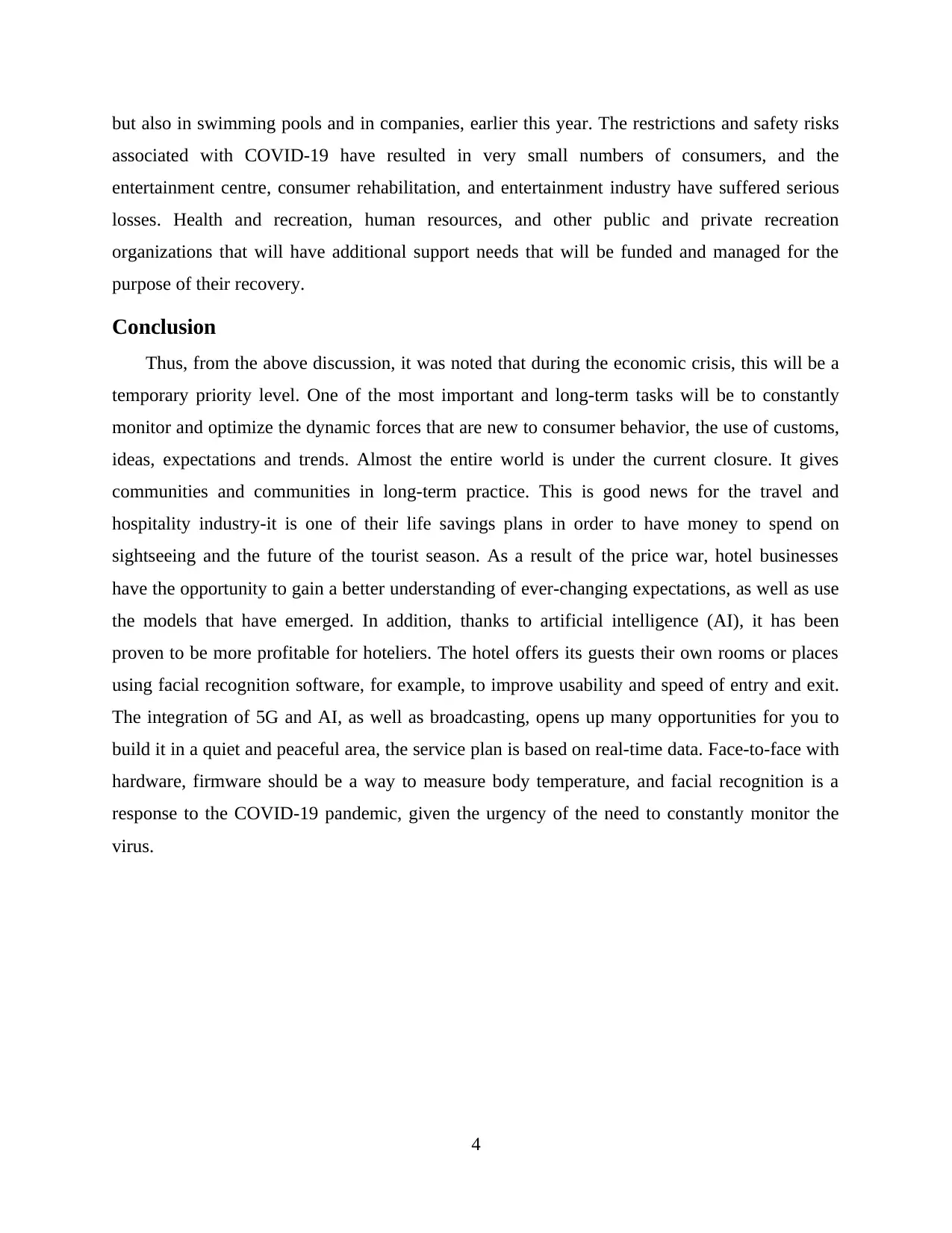
but also in swimming pools and in companies, earlier this year. The restrictions and safety risks
associated with COVID-19 have resulted in very small numbers of consumers, and the
entertainment centre, consumer rehabilitation, and entertainment industry have suffered serious
losses. Health and recreation, human resources, and other public and private recreation
organizations that will have additional support needs that will be funded and managed for the
purpose of their recovery.
Conclusion
Thus, from the above discussion, it was noted that during the economic crisis, this will be a
temporary priority level. One of the most important and long-term tasks will be to constantly
monitor and optimize the dynamic forces that are new to consumer behavior, the use of customs,
ideas, expectations and trends. Almost the entire world is under the current closure. It gives
communities and communities in long-term practice. This is good news for the travel and
hospitality industry-it is one of their life savings plans in order to have money to spend on
sightseeing and the future of the tourist season. As a result of the price war, hotel businesses
have the opportunity to gain a better understanding of ever-changing expectations, as well as use
the models that have emerged. In addition, thanks to artificial intelligence (AI), it has been
proven to be more profitable for hoteliers. The hotel offers its guests their own rooms or places
using facial recognition software, for example, to improve usability and speed of entry and exit.
The integration of 5G and AI, as well as broadcasting, opens up many opportunities for you to
build it in a quiet and peaceful area, the service plan is based on real-time data. Face-to-face with
hardware, firmware should be a way to measure body temperature, and facial recognition is a
response to the COVID-19 pandemic, given the urgency of the need to constantly monitor the
virus.
4
associated with COVID-19 have resulted in very small numbers of consumers, and the
entertainment centre, consumer rehabilitation, and entertainment industry have suffered serious
losses. Health and recreation, human resources, and other public and private recreation
organizations that will have additional support needs that will be funded and managed for the
purpose of their recovery.
Conclusion
Thus, from the above discussion, it was noted that during the economic crisis, this will be a
temporary priority level. One of the most important and long-term tasks will be to constantly
monitor and optimize the dynamic forces that are new to consumer behavior, the use of customs,
ideas, expectations and trends. Almost the entire world is under the current closure. It gives
communities and communities in long-term practice. This is good news for the travel and
hospitality industry-it is one of their life savings plans in order to have money to spend on
sightseeing and the future of the tourist season. As a result of the price war, hotel businesses
have the opportunity to gain a better understanding of ever-changing expectations, as well as use
the models that have emerged. In addition, thanks to artificial intelligence (AI), it has been
proven to be more profitable for hoteliers. The hotel offers its guests their own rooms or places
using facial recognition software, for example, to improve usability and speed of entry and exit.
The integration of 5G and AI, as well as broadcasting, opens up many opportunities for you to
build it in a quiet and peaceful area, the service plan is based on real-time data. Face-to-face with
hardware, firmware should be a way to measure body temperature, and facial recognition is a
response to the COVID-19 pandemic, given the urgency of the need to constantly monitor the
virus.
4
Paraphrase This Document
Need a fresh take? Get an instant paraphrase of this document with our AI Paraphraser

5
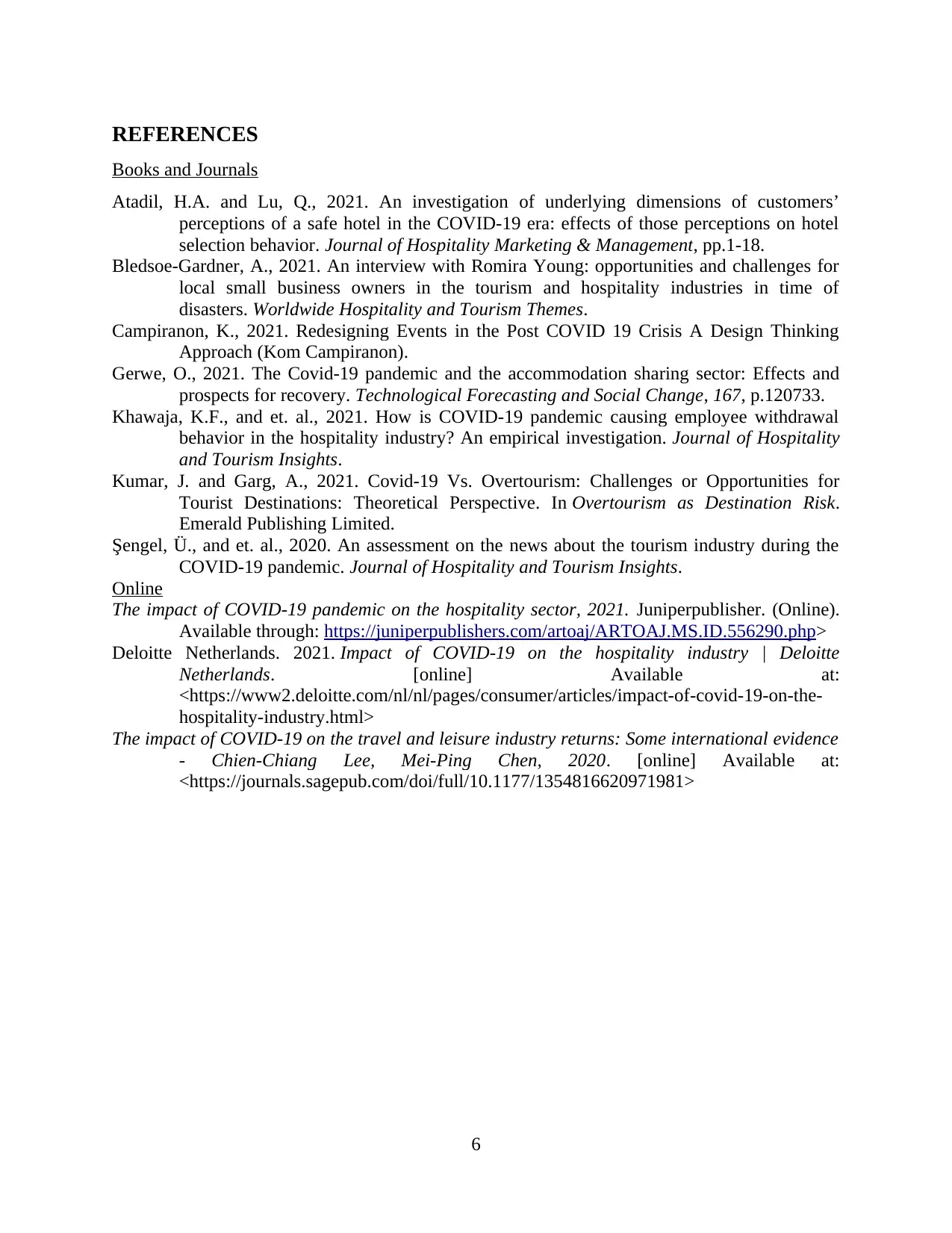
REFERENCES
Books and Journals
Atadil, H.A. and Lu, Q., 2021. An investigation of underlying dimensions of customers’
perceptions of a safe hotel in the COVID-19 era: effects of those perceptions on hotel
selection behavior. Journal of Hospitality Marketing & Management, pp.1-18.
Bledsoe-Gardner, A., 2021. An interview with Romira Young: opportunities and challenges for
local small business owners in the tourism and hospitality industries in time of
disasters. Worldwide Hospitality and Tourism Themes.
Campiranon, K., 2021. Redesigning Events in the Post COVID 19 Crisis A Design Thinking
Approach (Kom Campiranon).
Gerwe, O., 2021. The Covid-19 pandemic and the accommodation sharing sector: Effects and
prospects for recovery. Technological Forecasting and Social Change, 167, p.120733.
Khawaja, K.F., and et. al., 2021. How is COVID-19 pandemic causing employee withdrawal
behavior in the hospitality industry? An empirical investigation. Journal of Hospitality
and Tourism Insights.
Kumar, J. and Garg, A., 2021. Covid-19 Vs. Overtourism: Challenges or Opportunities for
Tourist Destinations: Theoretical Perspective. In Overtourism as Destination Risk.
Emerald Publishing Limited.
Şengel, Ü., and et. al., 2020. An assessment on the news about the tourism industry during the
COVID-19 pandemic. Journal of Hospitality and Tourism Insights.
Online
The impact of COVID-19 pandemic on the hospitality sector, 2021. Juniperpublisher. (Online).
Available through: https://juniperpublishers.com/artoaj/ARTOAJ.MS.ID.556290.php>
Deloitte Netherlands. 2021. Impact of COVID-19 on the hospitality industry | Deloitte
Netherlands. [online] Available at:
<https://www2.deloitte.com/nl/nl/pages/consumer/articles/impact-of-covid-19-on-the-
hospitality-industry.html>
The impact of COVID-19 on the travel and leisure industry returns: Some international evidence
- Chien-Chiang Lee, Mei-Ping Chen, 2020. [online] Available at:
<https://journals.sagepub.com/doi/full/10.1177/1354816620971981>
6
Books and Journals
Atadil, H.A. and Lu, Q., 2021. An investigation of underlying dimensions of customers’
perceptions of a safe hotel in the COVID-19 era: effects of those perceptions on hotel
selection behavior. Journal of Hospitality Marketing & Management, pp.1-18.
Bledsoe-Gardner, A., 2021. An interview with Romira Young: opportunities and challenges for
local small business owners in the tourism and hospitality industries in time of
disasters. Worldwide Hospitality and Tourism Themes.
Campiranon, K., 2021. Redesigning Events in the Post COVID 19 Crisis A Design Thinking
Approach (Kom Campiranon).
Gerwe, O., 2021. The Covid-19 pandemic and the accommodation sharing sector: Effects and
prospects for recovery. Technological Forecasting and Social Change, 167, p.120733.
Khawaja, K.F., and et. al., 2021. How is COVID-19 pandemic causing employee withdrawal
behavior in the hospitality industry? An empirical investigation. Journal of Hospitality
and Tourism Insights.
Kumar, J. and Garg, A., 2021. Covid-19 Vs. Overtourism: Challenges or Opportunities for
Tourist Destinations: Theoretical Perspective. In Overtourism as Destination Risk.
Emerald Publishing Limited.
Şengel, Ü., and et. al., 2020. An assessment on the news about the tourism industry during the
COVID-19 pandemic. Journal of Hospitality and Tourism Insights.
Online
The impact of COVID-19 pandemic on the hospitality sector, 2021. Juniperpublisher. (Online).
Available through: https://juniperpublishers.com/artoaj/ARTOAJ.MS.ID.556290.php>
Deloitte Netherlands. 2021. Impact of COVID-19 on the hospitality industry | Deloitte
Netherlands. [online] Available at:
<https://www2.deloitte.com/nl/nl/pages/consumer/articles/impact-of-covid-19-on-the-
hospitality-industry.html>
The impact of COVID-19 on the travel and leisure industry returns: Some international evidence
- Chien-Chiang Lee, Mei-Ping Chen, 2020. [online] Available at:
<https://journals.sagepub.com/doi/full/10.1177/1354816620971981>
6
⊘ This is a preview!⊘
Do you want full access?
Subscribe today to unlock all pages.

Trusted by 1+ million students worldwide
1 out of 9
Related Documents
Your All-in-One AI-Powered Toolkit for Academic Success.
+13062052269
info@desklib.com
Available 24*7 on WhatsApp / Email
![[object Object]](/_next/static/media/star-bottom.7253800d.svg)
Unlock your academic potential
Copyright © 2020–2026 A2Z Services. All Rights Reserved. Developed and managed by ZUCOL.



